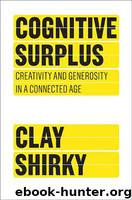Cognitive Surplus: Creativity and Generosity in a Connected Age by Clay Shirky

Author:Clay Shirky
Language: eng
Format: mobi
Tags: Technology & Engineering, Mass media - Social aspects, Sociology, Social Science, Web, Social aspects, Computers, Creativity, Social media, General, Management, Information Technology, Mass media, Self-Help, Information society, Media Studies, User Generated Content, Business & Economics
ISBN: 9781594202537
Publisher: Penguin Press
Published: 2010-06-10T01:21:36.885412+00:00
Kelly’s conclusion that defaults allow the designer to steer the system is critical. Defaults don’t drive the system, because they don’t create the motivations to use it. They simply steer those motivations to certain outcomes, provided the users are interested. Fanning designed Napster so that the default behavior was communal sharing. Two things were required to pull this off. The first was a medium that made sharing vanishingly cheap, and the second was a system of defaults that encouraged sharing.
Napster spread among the young not because they were more criminally minded than their elders, nor because they were possessed of a greater spirit of sharing. Napster spread for three much more prosaic reasons: (1) digital data is infinitely and perfectly copyable at zero marginal cost; (2) people will share if sharing is simple enough, and we generally resist being spiteful under the same conditions; and (3) Shawn Fanning designed a system to link (1) to (2) via the right incentives. That’s it. That’s what turned the recording industry upside down. Similarly, Napster’s original model was destroyed when the recording industry’s legal actions raised the cost of sharing high enough to unlink (1) and (2) for a significant number of people.
If that explanation sounds boring, well, it is boring, especially when compared to tales about how society is (pick one) going to hell in a handbasket or entering a period of higher consciousness. The rise of music sharing isn’t a social calamity involving general lawlessness; nor is it the dawn of a new age of human kindness. It’s just new opportunities linked to old motives via the right incentives. When you get that right, you can change the way people interact with one another in fairly fundamental ways, and you can shape people’s behavior around things as simple as sharing music and as complex as civic engagement.
Download
This site does not store any files on its server. We only index and link to content provided by other sites. Please contact the content providers to delete copyright contents if any and email us, we'll remove relevant links or contents immediately.
Cecilia; Or, Memoirs of an Heiress — Volume 1 by Fanny Burney(32554)
Cecilia; Or, Memoirs of an Heiress — Volume 2 by Fanny Burney(31951)
Cecilia; Or, Memoirs of an Heiress — Volume 3 by Fanny Burney(31935)
The Great Music City by Andrea Baker(31922)
We're Going to Need More Wine by Gabrielle Union(19040)
All the Missing Girls by Megan Miranda(15972)
Pimp by Iceberg Slim(14494)
Bombshells: Glamour Girls of a Lifetime by Sullivan Steve(14062)
For the Love of Europe by Rick Steves(13967)
Norse Mythology by Gaiman Neil(13356)
Talking to Strangers by Malcolm Gladwell(13356)
Fifty Shades Freed by E L James(13236)
Mindhunter: Inside the FBI's Elite Serial Crime Unit by John E. Douglas & Mark Olshaker(9329)
Crazy Rich Asians by Kevin Kwan(9282)
The Lost Art of Listening by Michael P. Nichols(7500)
Enlightenment Now: The Case for Reason, Science, Humanism, and Progress by Steven Pinker(7309)
The Four Agreements by Don Miguel Ruiz(6748)
Bad Blood by John Carreyrou(6617)
Weapons of Math Destruction by Cathy O'Neil(6270)
